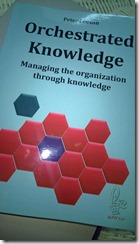With a mere 135 pages, Orchestrated Knowledge by Peter Leeson doesn't appear very substantial at first glance. But Leeson packs a lot into a small package. The book describes ways that companies can improve their quality and productivity. Leeson distills his decades of management consulting into a set of brief chapters describing the mistakes he has witnessed at various companies and recommendations for correcting these mistakes.
Leeson talks a lot about quality. He writes:
"The first thing that we need to consider in any organization is that quality is the most important thing. The quality of your work defines you. Whoever you are, whatever you do, I can find the same products and services cheaper somewhere else. But your quality is your signature."
 According to Leeson, Quality is achieved by people - not by tools, as so many believe. He urges organizations to empower their employees by listening to their ideas and allowing them apply their own creativity in performing their jobs and directing changes about their area. Employees will be happier and happier employees tend to be more productive and produce higher quality goods and services. Most organizations avoid this because they fear the risk of exposing flaw in their system and because they don't trust their employees.
According to Leeson, Quality is achieved by people - not by tools, as so many believe. He urges organizations to empower their employees by listening to their ideas and allowing them apply their own creativity in performing their jobs and directing changes about their area. Employees will be happier and happier employees tend to be more productive and produce higher quality goods and services. Most organizations avoid this because they fear the risk of exposing flaw in their system and because they don't trust their employees.
 Communication is a large focus of this book. Employees lose motivation when they don't know why changes are implemented, what goals the company hopes to achieve, and what projects are coming in the future. Communicating with employees not only empowers them, but allows them to focus their energies on the best way to solve problems, rather than on performing a set of rote tasks.
Communication is a large focus of this book. Employees lose motivation when they don't know why changes are implemented, what goals the company hopes to achieve, and what projects are coming in the future. Communicating with employees not only empowers them, but allows them to focus their energies on the best way to solve problems, rather than on performing a set of rote tasks.
The largest chapter describes what Leeson calls the "Orchestrated Knowledge Organization", which breaks the company into cells - each with a specific set of responsibilities and an area of quality on which to focus.
Leeson advocates evolutionary change over revolutionary change - keep what works in your organization and build on it, rather than reconstructing everything - a high-risk strategy that is difficult to adopt.
Orchestrated Knowledge does not provide many step-by-step instructions for your company to follow. But it does provide a lot of guidance that you can apply to your own organization to avoid mistakes and make it more successful.